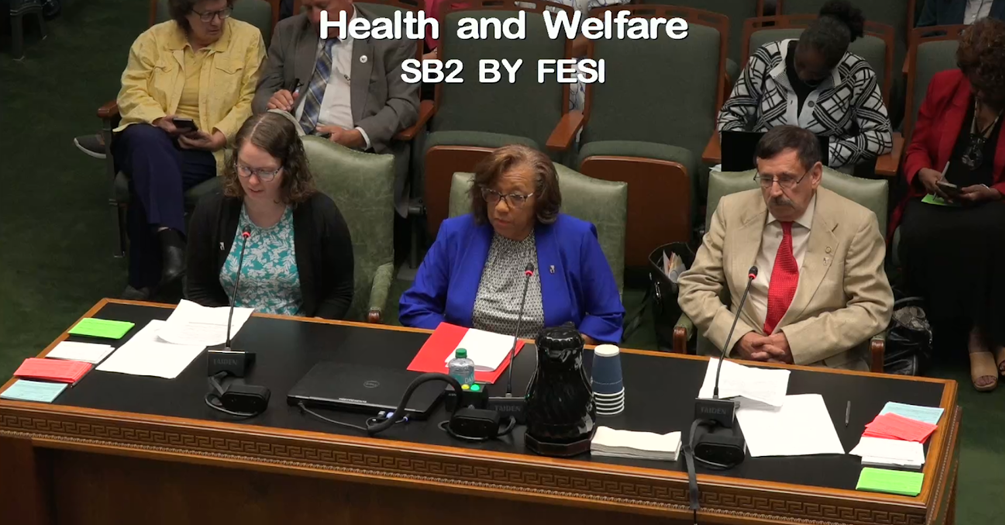My experience testifying against Louisiana's fluoride ban

Alicia Even
Master's student, Health Behavior & Health Equity
Water fluoridation has been called one of the greatest achievements in public health in the 20th century. Many Americans have a hard time seeing a dentist. Fluoride acts as a healthy mineral to combat bacteria in our mouths that eat away at our tooth enamel, which can cause plaque and cavities to form. US cities first started adding fluoride to water supplies in the 1940s.
Before beginning my MPH studies at the University of Michigan School of Public Health, I interned for EXCELth, a Federally Qualified Health Center in New Orleans. Many Louisiana residents have a hard time seeing a dentist. They may not be able to afford regular checkups, have to travel far distances, or have difficulty taking time off work. Eighty-six percent of state residents live in a designated Dental Health Professional Shortage Area. Although water fluoridation on its own is hardly enough to solve this problem, it’s extremely beneficial to everyone and might be the only line of protection for those unable to get regular dental care.
Shortly before I began my internship and returned to EXCELth, the Louisiana State Senate passed Senate Bill 2 (SB2), a bill to ban water fluoridation in Louisiana. EXCELth was in the middle of preparing to testify in front of the state’s House of Representatives. On the day of the testimony, the hearing was rescheduled for the following week. Although I was mainly working on a different project, I got absorbed into this one. I wasn’t originally on the list to testify, but not everyone was able to attend on this new date. My supervisor, Dr. Douglas Cross, thought I could testify along with him and Celeste Terry, the lead hygienist at EXCELth.
After asking where I could fill in, I did some research and wrote testimony on water fluoridation internationally. I read up on which countries did and didn’t have fluoride bans in place. I looked for studies comparing oral health in these places and found evidence confirming a correlation between water fluoridation and oral health. Not only that, but I was able to make the case that the reason the correlation wasn’t even larger was because of differences in access to dental care. With fewer providers in rural areas, there’s greater need for added fluoride.
When we got to the Louisiana State Capitol, I first felt intimidated by the splendor of the building and how formal everyone was. Having left my blazer in Ann Arbor, I worried I was underdressed. I got nervous that I wouldn’t know where to stand or would be asked questions I couldn’t answer.
SB2 was introduced to the floor, and after the legislation’s author and supporters spoke, Dr. Cross, Celeste, and I were the first to testify against the bill. There had been claims from previous speakers that many European countries had banned water fluoridation–I felt proud to have the data that no such bans were in place.
As we testified, many of the legislators seemed willing to listen and asked good questions. The representatives debated whether they should add an amendment to change the bill from banning water fluoridation altogether to allowing more choices for individual parishes (counties are called “parishes” in Louisiana). The amendment was voted down. Then, there was some question as to whether they would vote on the SB2 bill at the moment or table it for another time. By the insistence of the sponsor, they voted in the moment. They ended up voting 10-5 against the bill! We were so excited and all went out in the hall to congratulate each other.
Not only will water fluoridation remain in Louisiana, but with other states also considering bans, Dr. Cross is optimistic that preventing a ban in Louisiana will prevent a chain of bans throughout the country. I feel really proud to have played this part ensuring people across Louisiana—and, hopefully, across the US—have continued access to fluoride. As I hear about barriers to health getting larger and larger, I’m glad we were able to have this win for the people of Louisiana.
Lead image: Alicia Even (left) seated in a government hearing room, speaking on the health benefits of water fluoridation. Text displayed above them reads, "Health and Welfare SB2 BY FESI."
About the Author
 Alicia Even is a second year master’s student in Health Behavior & Health Equity at the University of Michigan School of Public Health. She’s currently completing an internship at EXCELth Family Health Center in New
Orleans East, compiling data on schools, Federally Qualified Health Centers, and health
outcomes in Louisiana parishes in preparation to implement a teledentistry program.
Alicia Even is a second year master’s student in Health Behavior & Health Equity at the University of Michigan School of Public Health. She’s currently completing an internship at EXCELth Family Health Center in New
Orleans East, compiling data on schools, Federally Qualified Health Centers, and health
outcomes in Louisiana parishes in preparation to implement a teledentistry program.
